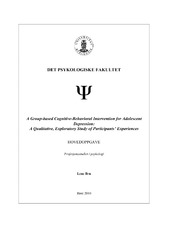A Group-based Cognitive-Behavioral Intervention for Adolescent Depression: A Qualitative, Exploratory Study of Participants' Experiences
Master thesis
Permanent lenke
https://hdl.handle.net/1956/4702Utgivelsesdato
2010-11-24Metadata
Vis full innførselSamlinger
- Faculty of Psychology [535]
Sammendrag
Cognitive-behavioral therapy (CBT) has been documented to be effective in treating depression in adolescence, but there is great variability in the clinical outcome of CBT trials. This may in part be due to variations in content and emphasis on different CBT components. Moreover, little is known about adolescents' subjective experiences of CBT interventions, which also might be related to outcome. In this qualitative study, nine adolescents were interviewed about their experiences of the specific components in a CBT group intervention. As positive and negative consequences of the group format seldom are explicitly considered in CBT group interventions, it was also explored how the adolescents experienced the group aspect. The results showed that the adolescents experienced the cognitive component of the course as most useful, but somewhat difficult to use. Psycho-education, behavioral activation and the social relationships component were also experienced as beneficial. The experiences regarding the relaxation-training and the homework-assignments were mixed. Negative aspects of the intervention included the experience of guilt related to being depressed. The group aspect was generally considered as an advantage, and most of the adolescents expressed a preference for the group format over an individual approach. Kognitiv atferdsterapi (KAT) er dokumentert effektiv i behandlingen av depresjon hos ungdom, men det er stor variasjon i kliniske utfall i studier av KAT. Dette kan delvis skyldes variasjon i vektleggingen av og innhold i de ulike komponentene i KAT. Man vet i tillegg lite om hvordan ungdommene selv opplever KAT intervensjoner, og subjektiv opplevelse kan også være relatert til utfall. I denne kvalitative studien ble ni ungdommer intervjuet om deres opplevelse av de spesifikke komponentene i en KAT gruppeintervensjon. Da positive og negative konsekvenser av gruppeformatet sjelden blir studert ved KAT gruppeintervensjoner, ble det også undersøkt hvordan ungdommene opplevde gruppeaspektet. Resultatene viste at ungdommene opplevde den kognitive komponenten som mest nyttig, men noe vanskelig å bruke. Psykoedukasjon, atferdsaktivering og fokus på sosiale relasjoner ble også opplevd som nyttig, mens det var mer blandede opplevelser knyttet til avslapningsøvelser og hjemmelekser. Rapporterte negative faktorer ved intervensjonen var opplevd skyldfølelse i forbindelse med å være deprimert. Gruppeaspektet ble generelt ansett som en fordel, og de fleste ungdommene foretrakk gruppeformatet fremfor individuelle tilnærminger.
Utgiver
The University of BergenOpphavsrett
Copyright the author. All rights reservedThe author
